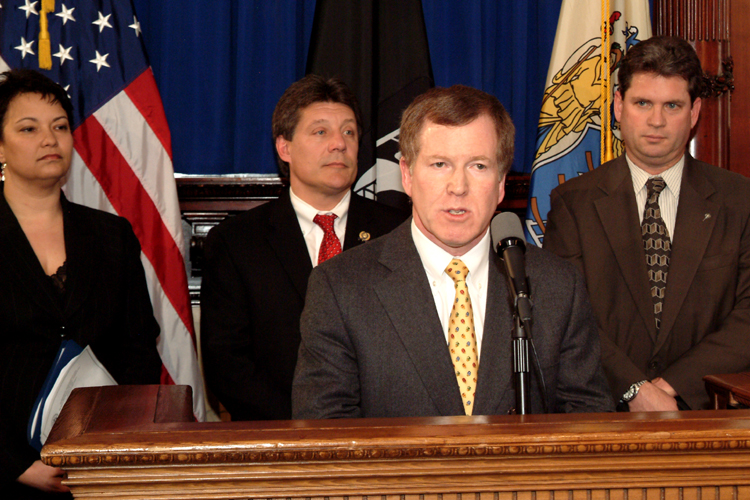
TRENTON – A bill sponsored by Senators Bob Gordon and Loretta Weinberg to require private entities under public contract to comply with stricter financing and transparency standards in an effort to avoid scandals like the EnCap debacle in the Meadowlands was signed into law yesterday by Governor Corzine.
“Public-private partnerships are important to create needed economic growth in New Jersey, but the people of our State deserve some guarantee for their investment,” said Senator Gordon, D-Bergen. “In the case of EnCap, hundreds of millions of dollars were funneled to an unqualified developer for one of the largest redevelopment projects ever undertaken in New Jersey. If private developers were required to invest more private capital and submit audited financial statements or risk losing public financing, the EnCap debacle might never have happened.”
“Not only do we have a responsibility to spend the taxpayers’ money wisely, but we have a responsibility to make sure that private redevelopment firms are held to that same standard,” said Senator Weinberg, D-Bergen. “EnCap misled the public by exaggerating the company’s assets and technical expertise, and the public ought to have a mechanism to reclaim some of those wasted funds. With today’s bill signing, public agencies will now have a way to collect lost funds from private developers who are only interested in enriching themselves at the public expense and have no intention of meeting their contracted obligations.”
The bill, S-1769, will require businesses receiving $50 million or more in public financial assistance for undertaking a redevelopment, remediation or environmental infrastructure project to meet certain enhanced financing and fiscal transparency standards. Under the new law, businesses that meet or exceed the financial assistance threshold for qualifying public contracts will be required to invest at least $1 of nonpublic moneys on the project for every $5 derived from public entities; will be required to post a performance bond equal to 110 percent of the cost of publicly-funded improvements under the project; and will be required to file annually with the contracting public entity and the State Treasurer – for the duration of the contract – audited financial statements concerning the activities of the project and of the business.
The Treasurer will also have the discretion to appoint a lead public entity for projects that fall below the $50 million public financing threshold if he or she sees fit, and the Office of State Comptroller will have the authority to audit the business’s use of any public funds to which the legislation applies and the expenditure of other funds on the project. The bill specifically exempts institutions of higher learning from the class of businesses covered under the bill, as well as projects associated with a facility that qualifies for job relocation or retention programs. Finally, the bill stipulates that any business that knowingly fails to submit a financial statement or report, or makes a material misrepresentation in any required disclosure, will be required to refund the financial assistance to the granting public entity.
“Obviously, there’s always some risk inherent in investing in major redevelopment projects, whether you’re a government entity or private redeveloper,” said Senator Gordon. “However, there is a difference between knowingly and falsely representing make-believe assets and experience, and succumbing to the pressures of the market. When public entities are duped by a private developer, particularly on projects that depend on public financing, there should be some sort of financial restitution paid to the taxpayers.”
The impetus for the lawmakers’ legislation was the controversy surrounding the landfill closure and redevelopment project being overseen by EnCap Golf Holdings, LLC in the New Jersey Meadowlands. Since 2000, EnCap had entered into multiple agreements with the New Jersey Meadowlands Commission, various State financial incentive programs, Bergen County and multiple municipalities whose boundaries fell within their development area for hundreds of millions of dollars in public financing to close four landfills and remediate and develop the surrounding property. In 2008, the State Inspector General released a report that found significant misrepresentations of EnCap’s qualifications and financial support, including the fact that the company only had approximately $18.9 million in capital – far below what was needed to complete the proposed project – and that, even though EnCap’s parent company, Cherokee Investment Partners, had experience in the field, EnCap itself was run by financial managers and a geologist who were inexperienced with landfill closures.
“While EnCap was selling New Jersey’s public entities a bill of goods in terms of the company’s financial commitment and expertise in redeveloping the four landfills in the Meadowlands, the public entities themselves didn’t do their due diligence in applying scrutiny,” said Senator Weinberg. “This bill will go a long way to make sure that the sort of duplicitous financing engaged in by EnCap will no longer be tolerated in the Garden State. But public agencies have to do their part too, and become better watchdogs of the public trust, to make sure that the EnCaps of the world cannot get away with defrauding New Jersey’s taxpayers ever again.”
The bill was approved by both houses of the Legislature in June.

